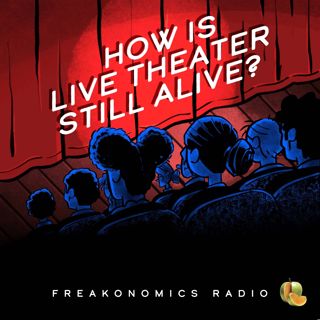
628. Sludge, Part 2: Is Government the Problem, or the Solution?
There is no sludgier place in America than Washington, D.C. But there are signs of a change. We’ll hear about this progress — and ask where Elon Musk and DOGE fit in. (Part two of a two-part series.) SOURCES:Benjamin Handel, professor of economics at UC Berkeley.Neale Mahoney, professor of economics at Stanford University.Jennifer Pahlka, founder of Code for America.Richard Thaler, professor of economics at The University of Chicago. RESOURCES:"How Big Is the Subscription Cancellation Problem?" by Giacomo Fraccaroli, Neale Mahoney, and Zahra Thabet (Briefing Book, 2024).Recoding America: Why Government Is Failing in the Digital Age and How We Can Do Better, by Jennifer Pahlka (2023).Nudge: The Final Edition, by Richard Thaler and Cass Sunstein (2021)."HealthCare.gov: Case Study of CMS Management of the Federal Marketplace," by Daniel Levinson (U.S. Department of Health and Human Services, 2016). EXTRAS:"Sludge, Part 1: The World Is Drowning in It," by Freakonomics Radio (2025).
4 Huhti 48min

627. Sludge, Part 1: The World Is Drowning in It
Insurance forms that make no sense. Subscriptions that can’t be cancelled. A never-ending blizzard of automated notifications. Where does all this sludge come from — and how much is it costing us? (Part one of a two-part series.) SOURCES:Benjamin Handel, professor of economics at UC Berkeley.Neale Mahoney, professor of economics at Stanford University.Richard Thaler, professor of economics at The University of Chicago. RESOURCES:"Selling Subscriptions," by Liran Einav, Ben Klopack, and Neale Mahoney (Stanford University, 2023)."The ‘Enshittification’ of TikTok," by Cory Doctorow (WIRED, 2023)."Dominated Options in Health Insurance Plans," by Chenyuan Liu and Justin Sydnor (American Economic Journal: Economic Policy, 2022).Nudge (The Final Edition), by Richard Thaler and Cass Sunstein (2021)."Frictions or Mental Gaps: What’s Behind the Information We (Don’t) Use and When Do We Care?" by Benjamin Handel and Joshua Schwartzstein (Journal of Economic Perspectives, 2018)."Adverse Selection and Switching Costs in Health Insurance Markets: When Nudging Hurts," by Benjamin Handel (National Bureau of Economic Research, 2011). EXTRAS:"People Aren’t Dumb. The World Is Hard. (Update)" by Freakonomics Radio (2024)."All You Need is Nudge," by Freakonomics Radio (2021)."How to Fix the Hot Mess of U.S. Healthcare," by Freakonomics Radio (2021)."Should We Really Behave Like Economists Say We Do?" by Freakonomics Radio (2015).
28 Maalis 54min

Should America Be Run by … Trader Joe’s? (Update)
The quirky little grocery chain with California roots and German ownership has a lot to teach all of us about choice architecture, efficiency, frugality, collaboration, and team spirit. SOURCES:Kirk DesErmia, facilities manager in Seward, Alaska.Mark Gardiner, journalist and author.Sheena Iyengar, professor of business at Columbia Business School.Michael Roberto, professor of management at Bryant University. RESOURCES:“Trader Joe’s,” David Ager and Michael Roberto (Harvard Business School Case, 2014).“What Brands Are Actually Behind Trader Joe’s Snacks?,” Vince Dixon (Eater, 2017).Build a Brand Like Trader Joe’s by Mark Gardiner (2012).“When Choice is Demotivating: Can One Desire Too Much of a Good Thing?,” Sheena Iyengar and Mark Lepper (Journal of Personality and Social Psychology, 2000).Unlocking Creativity, by Michael Roberto (2019). EXTRAS:“How Can This Possibly Be True?,” by Freakonomics Radio (2016).“How to Save $1 Billion Without Even Trying,” by Freakonomics Radio (2016).
21 Maalis 48min

626. Ten Myths About the U.S. Tax System
Nearly everything that politicians say about taxes is at least half a lie. They are also dishonest when it comes to the national debt. Stephen Dubner finds one of the few people in Washington who is willing to tell the truth — and it’s even worse than you think. SOURCES:Jessica Riedl, senior fellow in budget, tax, and economic policy at the Manhattan Institute. RESOURCES:"The House Wants to Pass Trump’s Agenda in One Big Bill. Here’s What’s in It." by Margot Sanger-Katz and Alicia Parlapiano (New York Times, 2025)."Correcting the Top 10 Tax Myths," by Jessica Riedl (Manhattan Institute, 2024)."Spending, Taxes, and Deficits: A Book of Charts," by Jessica Riedl (Manhattan Institute, 2024)."Why Did Americans Stop Caring About the National Debt?" by Jessica Riedl (Reason, 2024)."A Comprehensive Federal Budget Plan to Avert a Debt Crisis," by Jessica Riedl (Manhattan Institute, 2024)."When Does Federal Debt Reach Unsustainable Levels?" by Jagadeesh Gokhale, Kent Smetters, and Mariko Paulson (The Wharton School of Business, 2023)."The Limits of Taxing the Rich," by Jessica Riedl (Manhattan Institute, 2023). EXTRAS:"Farewell to a Generational Talent," by Freakonomics Radio (2024).
14 Maalis 1h 3min

625. The Biden Policy That Trump Hasn’t Touched
Lina Khan, the youngest F.T.C. chair in history, reset U.S. antitrust policy by thwarting mega-mergers and other monopolistic behavior. This earned her enemies in some places, and big fans in others — including the Trump administration. Stephen Dubner speaks with Khan about her tactics, her track record, and her future. SOURCES:Lina Khan, former commissioner of the Federal Trade Commission and professor of law at Columbia Law School. RESOURCES:"Merger Guidelines" (U.S. Department of Justice and the Federal Trade Commission, 2023)."The Rise of Market Power and the Macroeconomic Implications," by Jan De Loecker, Jan Eeckhout, and Gabriel Unger (National Bureau of Economic Research, 2019)."US Antitrust Law and Policy in Historical Perspective," by Laura Phillips Sawyer (Harvard Business School, 2019).The Curse of Bigness: Antitrust in the New Gilded Age, by Tim Wu (2018)."Amazon’s Antitrust Paradox," by Lina Khan (Yale Law Journal, 2017)."A Tempest In a Coffee Shop," by Tanya Mohn (New York Times, 2004). EXTRAS:"The Economics of Eyeglasses," by Freakonomics Radio (2024)."Should You Trust Private Equity to Take Care of Your Dog?" by Freakonomics Radio (2023)."Are Private Equity Firms Plundering the U.S. Economy?" by Freakonomics Radio (2023)."Is the U.S. Really Less Corrupt Than China — and How About Russia? (Update)" by Freakonomics Radio (2022).
7 Maalis 1h 3min

EXTRA: The Downside of Disgust (Update)
It’s a powerful biological response that has preserved our species for millennia. But now it may be keeping us from pursuing strategies that would improve the environment, the economy, even our own health. So is it time to dial down our disgust reflex? You can help fix things — as Stephen Dubner does in this 2021 episode — by chowing down on some delicious insects. SOURCES:Paul Rozin, professor of psychology at the University of Pennsylvania.Val Curtis, late disgustologist at the London School of Hygiene and Tropical Medicine.Sandro Ambuehl, economist at the University of Zurich.Emily Kimmins, R&D lead for the sensory and consumer-science team for Kraft Heinz.Iliana Sermeno, former chef at The Black Ant. RESOURCES:“Stink Bugs Could Add Cilantro Flavor to Red Wine,” by Alex Berezow (Live Science, 2017).“Edible insects: Future Prospects for Food and Feed Security,” by the F.A.O. (United Nations, 2013).“I Hate to Break it to You, but You Already Eat Bugs,” by Kyle Hill (Scientific American, 2013).“Five Banned Foods and One That Maybe Should Be,” by Leah Binkovitz (Smithsonian Magazine, 2012).“Effects of Different Types of Antismoking Ads on Reducing Disparities in Smoking Cessation Among Socioeconomic Subgroups,” by Sarah J. Durkin, Lois Biener, and Melanie A. Wakefield (American Journal of Public Health, 2009).“Flesh Trade,” by Stephen Dubner and Steven Levitt (The New York Times, 2006).“Feeding Poultry Litter to Beef Cattle,” by Jay Daniel and K.C. Olson (University of Missouri, 2005). EXTRAS:"Why Does Everyone Hate Rats?" by Freakonomics Radio (2025).
5 Maalis 44min

624. The Animal No One Loves, Until They Do
To most people, the rat is vile and villainous. But not to everyone! We hear from a scientist who befriended rats and another who worked with them in the lab — and from the animator who made one the hero of a Pixar blockbuster. (Part three of a three-part series, “Sympathy for the Rat.”) SOURCES:Bethany Brookshire, author of Pests: How Humans Create Animal VillainsJan Pinkava, creator and co-writer of "Ratatouille," and director of the Animation Institute at the Film Academy Baden-Württemberg.Julia Zichello, evolutionary biologist at Hunter College. RESOURCES:"Weekend Column: Rat’s End, or, How a Rat Dies," by Julia Zichello (West Side Rag, 2024).Pests: How Humans Create Animal Villains by Bethany Brookshire (2022)."Rats: the history of an incendiary cartoon trope," by Archie Bland (The Guardian, 2015)."Catching the Rat: Understanding Multiple and Contradictory Human-Rat Relations as Situated Practices," by Koen Beumer (Society & Animals, 2014)."Effects of Chronic Methylphenidate on Dopamine/Serotonin Interactions in the Mesolimbic DA System of the Mouse," by Bethany Brookshire (Wake Forest University, 2010)."A New Deal For Mice," by C.C. Little (Scientific American, 1935).
28 Helmi 45min

623. Can New York City Win Its War on Rats?
Even with a new rat czar, an arsenal of poisons, and a fleet of new garbage trucks, it won’t be easy — because, at root, the enemy is us. (Part two of a three-part series, “Sympathy for the Rat.”) SOURCES:Kathy Corradi, director of rodent mitigation for New York City.Robert Corrigan, urban rodentologist and pest consultant for New York City.Ed Glaeser, professor of economics at Harvard University.Robert Sullivan, author of Rats: Observations on the History and Habitat of the City’s Most Unwanted Inhabitant.Jessica Tisch, New York City police commissioner. RESOURCES:"Increasing rat numbers in cities are linked to climate warming, urbanization, and human population," by Jonathan Richardson, Elizabeth McCoy, Nicholas Parlavecchio, Ryan Szykowny, Eli Beech-Brown, Jan Buijs, Jacqueline Buckley, Robert Corrigan, Federico Costa, Ray Delaney, Rachel Denny, Leah Helms, Wade Lee, Maureen Murray, Claudia Riegel, Fabio Souza, John Ulrich, Adena Why, and Yasushi Kiyokawa (Science Advances, 2025)."The Next Frontier in New York's War on Rats: Birth Control," by Emma Fitzsimmons (New York Times, 2024)."The Absurd Problem of New York City Trash," by Emily Badger and Larry Buchanan (New York Times, 2024)."Mourning Flaco, the Owl Who Escaped," by Naaman Zhou (The New Yorker, 2024).Rats: Observations on the History & Habitat of the City's Most Unwanted Inhabitants, by Robert Sullivan (2005). EXTRAS:"The Downside of Disgust," by Freakonomics Radio (2021)
21 Helmi 50min






















